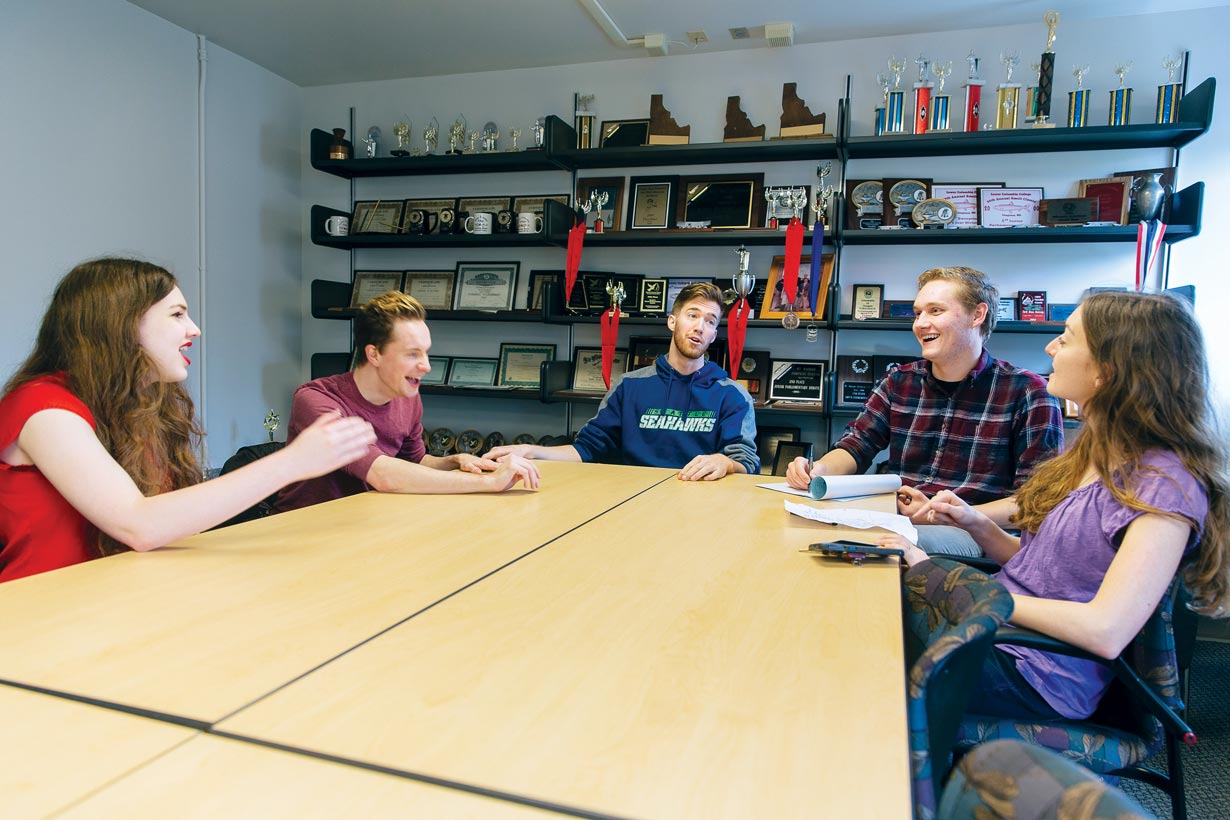Arts & Culture Faithful Creativity
SPU Debate Team Continues Storied Tradition
For decades, SPU debaters have harnessed the power of words and made it their own
By Clint Kelly | Photo by Daniel Sheehan
 Decades of trophies earned by SPU debaters line the walls of
the room where the Debate Team currently meets.
Decades of trophies earned by SPU debaters line the walls of
the room where the Debate Team currently meets.
For former Seattle Pacific University debater Dustin Rudolph, the toughest debate topics were the ones where he had too strong an opinion and little understanding of the opposition. Says the 2002 graduate of those four years spent arguing his convictions, “Being overly opinionated usually meant that I hadn’t read up enough on the side of the issue with which I disagreed.”
In his seven years as a sheriff’s deputy and a police officer, Rudolph discovered that debating had left him able to hear arguments more clearly, to recognize contradictions more quickly, and to communicate more effectively.
“That’s true even more now that I’m in the church,” says Rudolph, currently the associate pastor of Littlerock Community Fellowship of Littlerock, Washington.
Reasoned discourse can be all too rare in a society steeped in pop culture and a race to the White House. In these arenas, informed speech is often the first casualty.
Gary Philipsen, coach of the SPU Debate Team and a University of Washington professor emeritus in communication, has fielded a team of five women and five men to wage a battle of argumentation and persuasion. Their opponents? Collegiate debate teams from across the region and the nation.
SPU student debaters hone their keen minds and sharp wits on complex topics such as “The House Affirms President Obama’s Iran Nuclear Treaty.” Open to all undergraduate students, the debate team includes majors in nursing, economics, psychology, and political science.
“We attract smart, interesting, high caliber individuals whatever their majors,” says Philipsen, who coached the team at the International Public Debate Association National Tournament, March 31–April 3, at Lee College in Texas. “They must try to convince a judge of the rightness of their case. Because of their talent and their SPU liberal arts education, our debaters hold their own very well against teams with experience in three times as many debate tournaments as we can afford to attend.”
Working within a slender budget, Philipsen says the program would benefit greatly from the support of SPU alumni and friends of the University. “Greater support of the travel budget could be transformative,” he says, “as would more direct alumni involvement in the program.” Individual debaters receive endowed scholarship assistance.
The history of debate at Seattle Pacific goes back more than 100 years. Prior coaches include Lillian Danielson, Paul Rosser, Bill Hanson, Bill Purcell, and Debra Sequeira. Debate team alumni include Ryan Jablonski ’04, an assistant professor in the Department of Government at the London School of Economics and Political Science.
For political science and history major Joey Rebbe, debating is so enjoyable “the stress of competition is almost negligible.” Academic benefits, says the senior debater and four-year team veteran, include the ease of writing essays and “the ability to advocate for anything, almost instantly, off the top of my head.”
To Sequeira, now dean of the Division of Arts and Humanities, a liberal arts education is not complete without debate experience. “Now more than ever, students need to understand that true debate requires actual evidence and a civil exchange of ideas.”
